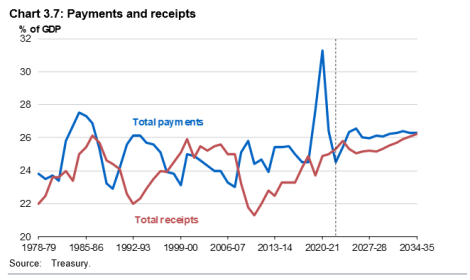 Spending ratcheting higher and higher
Spending ratcheting higher and higher
The budget cements poor policy into place that will persist for decades. Some of what we think is in my piece for the Epoch Times “A triple ‘F’ rating for this Federal budget which you can read by clicking here.
In that piece I characterised the budget as “fat flaccid and foolish” and asked whether we Australians had become the same. How bad was the budget in words less than a full-length op-ed?
Well the graph above, taken from Budget Paper Number 1 Statement 3 tells the story. The graph conveniently starts after the Whitlam government (strategically perhaps) where he took government expenditure from roughly 17% of GDP and put it on a trajectory to where, in 1982 it almost hit 28%. Malcolm Fraser gets the blame because he was in power in 1982, but he had limited choices given where he started.
In the 40 or so years since governments have wrestled with government spending, pinning it to the floor generally around 23% of GDP – not perfect, but good by world standards – but with regular escapes up to 26%..
Bob Hawke got spending under control, with an outbreak under PM (not treasurer) Keating in 1993. John Howard brought it well under control again, but then spending shot up again – substantially under Rudd/Gillard Labor, but massively under Morrison during the COVID pandemic.
With the COVID policy settings in the rear view mirror a good government would be trying to return us to back to the status quo ante, at the very least, but this is not a good government.
As you can see from the graph, they are cementing in government at a significantly higher continuous level than it has ever been. Even though they expect to be running deficits in the future, taxation receipts are set to lift to, and then stay at, 26% or so of GDP.
This is a recipe for both higher inflation and stagnation. If you remember the 70s you will be able to put those memories to good use this decade.
Two questions, and the answers to them, could make this next ten years different from the past.
Whitlam got only the equivalent of one term (two elections, but only three years). What if Albo wins the next election?
And second question. If Dutton wins the next election, how does he avoid being another Fraser – taking the blame for the pain that Albo/Whitlam caused, while only partially unwinding the damage because of the public relations minefield left for him by the previous government?